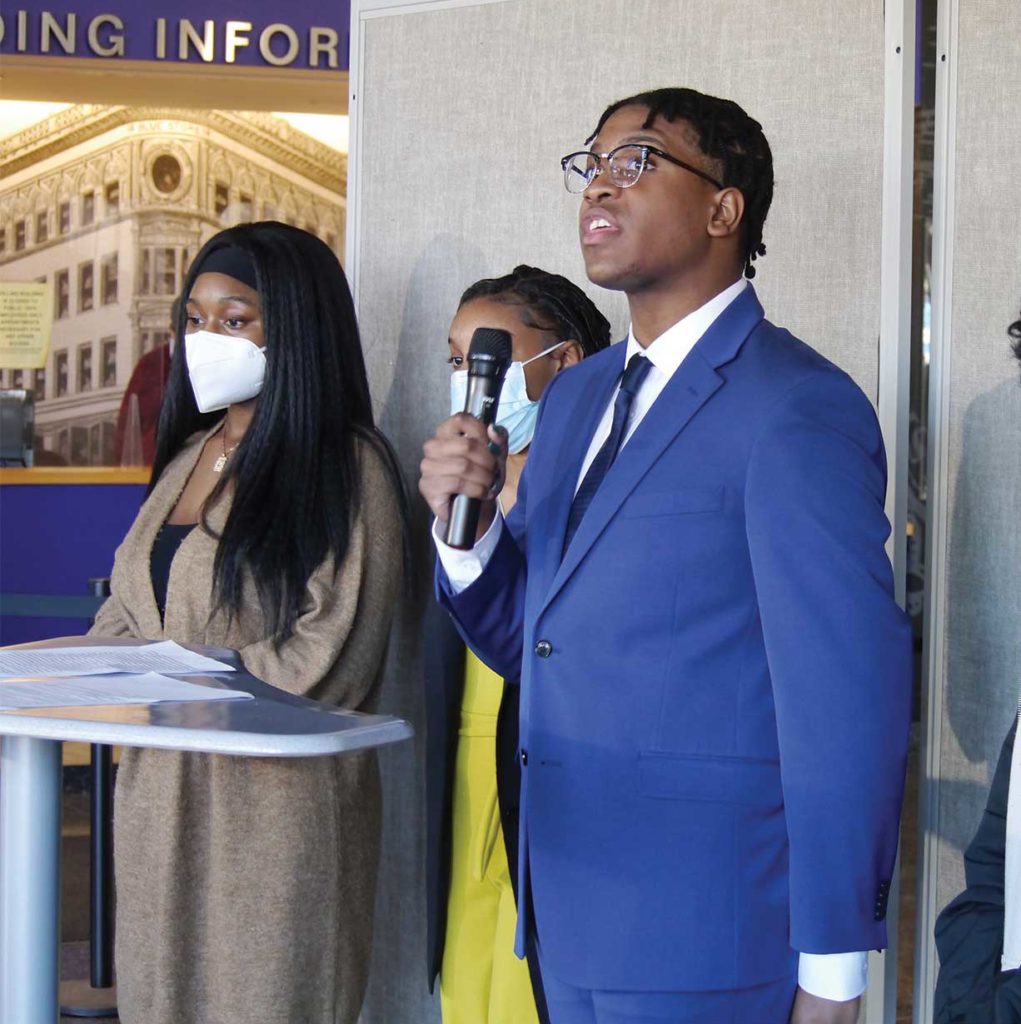
Twelve of the 49 members of the Boston Student Advisory Council resigned last week amid charges that the head of the nonprofit that administers the group engaged in emotionally abusive behavior and sought to stifle the voices of students challenging the administration of Boston Public Schools.
Saturday morning, six of the former BSAC members spoke during a press conference they held at the Boston Public Schools headquarters in the Bolling Building. They described how they were coerced into participating in controversial counseling sessions in the basement of the home of Jenny Sazama, founder and director of Youth on Board, the nonprofit that manages BSAC.
Boston Latin Academy senior Khymani James, who gave up his seat on the School Committee when he resigned from BSAC last week, said BPS staff and his fellow School Committee members often brushed aside the comments and concerns he and other students brought to them.
“Had my adult colleagues asked similar questions or raised similar concerns, they would have been provided substantial responses,” he said. “All in all, my voice was not valued whatsoever.”
Monday, Boston Public Schools officials announced they suspended their contract with Youth on Board and will initiate an independent investigation of the program.
Students in BSAC represent their schools in a citywide council. BSAC members are elected to represent their schools by fellow students. The organization is meant to give students a voice in education policy. One BSAC member is elected to serve as a non-voting member on the School Committee.
The council is managed by Youth on Board, a nonprofit that pays student representatives for their youth organizing and advocacy work. James and other students at the press conference Saturday said Sazama strongly encouraged student representatives on BSAC to participate in sessions she held Wednesdays in the basement of her home, using “re-evaluation therapy” to encourage students to talk about their traumas.
The sessions were called “Wellness Wednesdays” and students were paid to participate in the activity. Boston Latin Academy senior Charlene Adames-Pimentel said she and other students felt pressured to participate in the sessions.

Charlene Adames-Pimentel BANNER PHOTO
“There was much weird behavior going on behind the scenes, especially during Jenny Sazama’s cult meetings named RC, in which I would somewhat feel pressured to share extremely personal information within these groups,” she said. “It is adults like her, especially white adults, that feel it is appropriate to cross boundaries with mostly Black and Hispanic minorities in this work and share her personal traumas with young advocates as if they are therapists.”
The students said many BSAC members depended on the income they earned from participating in the program and felt pressured to attend the meetings.
While Adames-Pimentel said she only shared information about things that happened at school, she said young advocates were coerced into sharing personal information about traumatic events in their lives.
Re-evaluation counseling is a controversial practice in which participants listen to one another and are encouraged to “discharge” negative emotions, such as sadness or fear, often through crying. Created by Harvey Jackins, an early associate of Scientology founder L. Ron Hubbard, the methodology has been criticized for lacking scientific verification of its efficacy.
Sazama did not respond to an email seeking comment for this story.
A spokesperson for BPS said Saturday in a statement that district officials have called family members of students to acknowledge the accusations aired by the students.
“Mr. James’ accusations are concerning, but we want to emphasize that we are meeting with students, families, and staff to understand more and learn if these are the shared feelings of other students on BSAC,” the statement reads. “Mr. James and one other BSAC member have raised concerns about the listening circles that are part of their regular meetings. We are reviewing the use of this practice, as a result of what was shared by Mr. James and other students.”
In addition to their complaints about the counseling sessions, the students also said Youth on Board staff often sought to edit the remarks they made during School Committee meetings and temper their criticism of BPS policies and leadership.
“Numerous adult staff on the Boston Student Advisory Council had made it immensely obvious that students are there to make the district and superintendent look good, rather than rather than improve BPS policies and discuss the needs and priorities of students,” said Naesoj Ware, a junior at the John D. O’Bryant School.
James, who has in recent months pressed for the student representative to the School Committee to have a vote, said Saturday that that change is among the key demands students have.
“The student representative will never truly be welcomed into that space if they are not given a vote, the same compensation and the same treatment as other committee members,” James said.
Remaining BSAC members released at statement on Facebook Monday calling for re-evaluation counseling to be replaced by trained therapy professionals, the resignation of Sazama as co-leader of BSAC and greater autonomy for BSAC.
“Changing BSAC’s culture to truly amplify student voices will not be easy and we respect the decision of anyone who has chosen to step down,” the statement read.
In his last meeting as a student representative, James clashed with appointed School Committee members when he asked that the body adopt a resolution opposing the administration of the MCAS test this year. While other school committees in the state have adopted similar resolutions, the Boston School Committee did not.
James and other ex-BSAC members also are calling for the abolition of the appointed School Committee and the re-establishment of an elected body.
“Committee members can never give students the actual respect and urgency and energy that they deserve, because they don’t feel any allegiance to them,” James said. “They were appointed by a mayor.”







